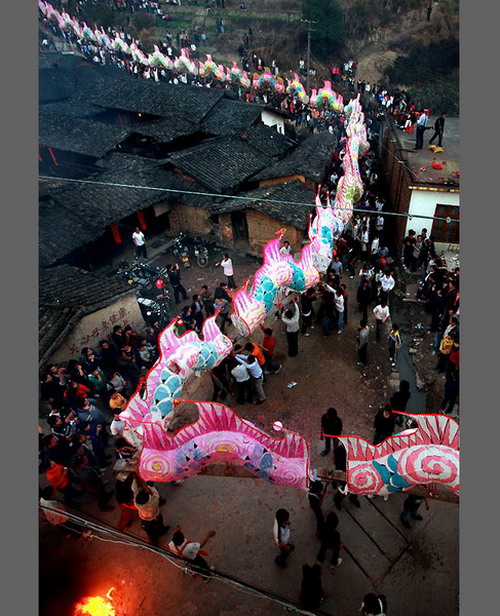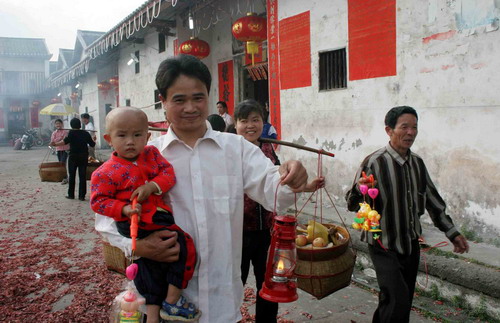| About Hubei | Culture & Arts | ||
| Attractions | Routes | ||
| Dining | Shopping | ||
| Hotels | Transportation | ||
| Entertainment | Travel agencies |
Jingshan to attract Wuhan tourists
Storytelling queen
For the love of Wuhan
Dangyang to promote tourism


Folk customs of Hakka People in Hubei
Updated: 2011-12-29
Hakka People are particular about ancient customs and have carried on many traditions. They will eat soup on the first day of the lunar year, rice crackers and fruit sugars on January 20, mashed tea on February 15, fried green beans when insects are awake and black dyed rice on the Tomb-sweeping Day. They will have brewed bean curd and rice-flour meat when summer begins, rice-pudding and duck eggs on the Dragon Boat Day, white spirit and dog meat on June 6 and new rice when grains are harvested. On July 7 they will have melons and fruits, ducks for ancestor worship on July 15, moon cakes and peeled yams during the Mid-autumn Festival and potato and rice crackers on September 9. Sticky rice cakes are eaten on October 1, porridge on December 8, festival feast to see off the kitchen god on December 24, and fried rice cakes on New Year' Eve.
 |
| Folk customs of Hakka People in Hubei |
The Hakka People believe that festivals are as lively without these events. They teach the young through activities and give them knowledge and expectations about these folk customs. In the first day of the year, they take soup with green onion, garlic and celery. In partial tones, green onion indicates intelligence, garlic represents careful calculation and strict budgeting, and celery implies diligence. Frying green beans while insects are awake is meant for disinfestations, indicating insects will be fried as beans. Peeling yams on Mid-autumn Festival is a religious metaphor of stripping the ghosts of skins.
Hakka People is a branch of the Han nationality. They are known for diverse etiquettes. When they entertain guests, the host will accompany male guests and offer cigarettes, while the hostess serves tea. The host will not receive guests with their "bare upper body" or when "wearing knickers" only. He will not stoop down, cross legs, pick his nose, or play with his feet. It takes skill to serve tea and the hostess must hold the cups of tea for one or two guests or use a tray for many guests. She holds one cup of tea with both hands when handing it to a guest. The guest needs to stand up to receive the cup of tea or say sorry for not getting up. The hostess replies, "You are welcome." She applies five fingers of the right hand and four fingers of the left hand to serve the tea, implying "people from everywhere – the five lakes and four seas – are brothers. It is a small world and we'll definitely reencounter."
Dinner party
When having a meal with guests, Hakka People will give precedence to the guests or elders out of courtesy.
They start with distinguished guests to pour out liquor in a feast. In the case of square table and round tables, the person accompanying guests sits in the eighth seat at a square table and the tenth seat at a round table. He or she pours the liquor from the first seat to the eighth in a square table, and from the first seat to the tenth in a round table.
Hakka People remain particular about their customs, especially in rural areas. The host will fill rice bowls for their guests and show them the dishes. Family members of the host will not intrude on the seats of guests or tread on the crosspieces the guests' seats. They will only take food from nearby plates. When stuffed, they will not leave the table. They will put chopsticks on their own rice bowls, meaning they are to wait for others to finish the meal. They will tell the guests to take their time and say sorry for taking the lead. They are able to leave the table when the guests say "not at all, as you please." If all the people put their chopsticks on their rice bowls, they are expressing discontent or saying they have not eaten their fill.
Depart with guests
When a guest mentions that they must leave, the host will first urge him or her to stay. If the guest makes it clear they have to leave, the host will fetch the belongings for the guest, open up the door, and see him or her off. The guest will say, "Don't bother to come any further." The host then salutes or shakes hands with the guest in farewell. When several guests stay together, the elders go ahead of the rest.
 |
| Folk customs of Hakka People in Hubei |
Hakka People have many other courtesies. When children get up in the morning or go to sleep at night, they are to pay respects to the parents or the elders. When the younger generation returns from a trip, they are to say hello first to the elders. This etiquette shall not be violated. When relatives and friends have happy events or funerals, the Hakka People would offer help and send gifts. They are ready to share fresh food with neighbors at any time.